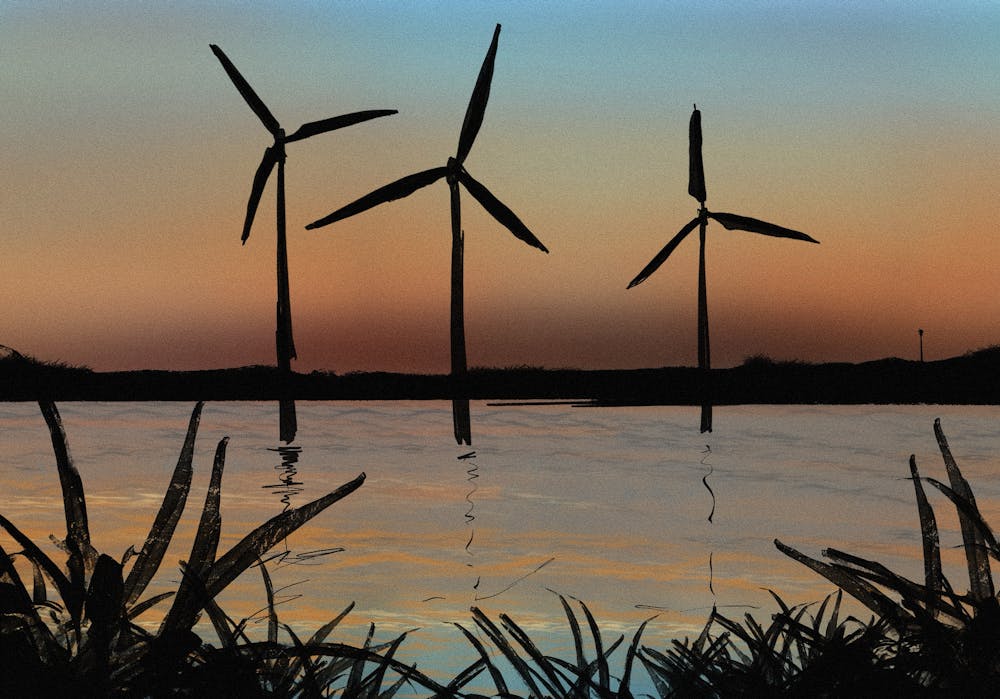This article is part of an Earth Month series exploring environmental issues, climate initiatives and community stakeholders throughout Providence and Rhode Island.
Last month, South Fork Wind Farm — located off the coast of Rhode Island — began producing power, making Rhode Island home to the country’s first utility-scale wind farm.
The wind farm, which provides power to New York, is a joint venture between energy companies Ørsted and Eversource. This project followed the construction of Rhode Island’s Block Island Wind Farm, which became operational in 2016 and was the first offshore wind farm in the United States. The Block Island project powers roughly 17,000 homes, while the new South Fork project could power up to around 70,000 homes and businesses.
Ørsted and Eversource are also collaborating to build Revolution Wind, a 704-megawatt offshore wind farm that will provide power to Rhode Island and Connecticut and is expected to become operational by 2025.
Revolution Wind will “complement existing energy sources to help ensure the area has enough power during peak hours,” create 1,200 jobs and supply electricity to more than 350,00 homes in the states, according to the project’s website.
In October 2023, the Rhode Island Office of Energy Resources announced a memorandum of understanding with Massachusetts and Connecticut to coordinate offshore wind developments in the region. The document marked “the first nationwide agreement for offshore wind procurement collaboration among multiple states,” spokesperson Robert Beadle wrote in an email to The Herald.
Community stakeholders have expressed concerns about the project’s development, The Herald previously reported. Some Rhode Island fishermen have stated they worry that the project will disrupt local ecosystems and navigation of waters.
Last month, the joint venture’s Sunrise Wind project, another wind farm, received its Record of Decision — a critical milestone in the farm’s approval process — from the U.S. Department of the Interior's Bureau of Ocean Energy Management. The project will also provide clean energy to New York State.
“Together, South Fork Wind, Revolution Wind and Sunrise Wind represent the start of a new era of American clean energy,” a Ørsted and Eversource joint venture spokesperson wrote in an email to The Herald. “Large-scale offshore wind is a game-changer for our environment, our economy and the future of American energy, and we are proud to be building that infrastructure here in the Northeast.”
As new offshore wind farms become operational, New England’s power grids will require adjustments to accommodate the new sources of clean energy.
In an email to The Herald, ISO New England Spokesperson Mary Cate Colapietro explained the organization’s role in addressing any necessary changes for integrating offshore wind farms into the power grid. The non-profit organization oversees electricity markets and manages changes to the power-grid system over time.
“Additional power generators like offshore wind projects require robust transmission to deliver energy to where it is in high demand,” Colapietro wrote. “ISO New England is working to adapt our system operations and energy markets so the grid stays reliable and prices remain competitive.”
According to Colapietro, Rhode Islanders get their power from two interconnected energy grids.
“One (power grid) is the small distribution system that delivers electricity to homes and businesses,” Colapietro wrote. “The larger regional power grid operated by ISO New England … transmits larger quantities of electricity from nearly 400 generating resources.”
She noted that ISO New England, while operating the regional power grid, does not “own or maintain any grid infrastructure, enact or set policy or handle retail electricity.”
The U.S. Energy Information Administration reports that Rhode Island remains reliant on natural gas as its main source of energy. The state currently aims to reach 100% renewable energy by 2033.
According to Colapietro, New England must “add almost twice as much new generation as it added in the last 25 years” to reach these goals by 2033.
“Offshore wind is a key component to meeting states’ ambitious renewable energy targets and transitioning our country to a clean energy future,” the spokesperson for the Ørsted and Eversource joint venture wrote. “We are encouraged by the overwhelming support for offshore wind we have seen across all sectors, and we look forward to continuing to build out this critical sector of our economy.”

Sophia Wotman is a University news editor covering activism and affinity & identity. She is a junior from Long Island, New York concentrating in Political Science with a focus on women’s rights. She is a jazz trumpet player, and often performs on campus and around Providence.





